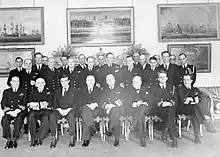Geoffrey Blake (Royal Navy officer)
Vice Admiral Sir Geoffrey Blake, KCB, DSO (16 September 1882 – 18 July 1968) was an officer in the Royal Navy who went on to be Fourth Sea Lord.
Sir Geoffrey Blake | |
|---|---|
 Sir Geoffrey Blake | |
| Born | 16 September 1882 Alverstoke, Hampshire, England |
| Died | 18 July 1968 (aged 85) Chelsea, London, England |
| Allegiance | |
| Service/ | |
| Years of service | 1897–1945 |
| Rank | Vice Admiral |
| Commands held | HMS Queen Elizabeth New Zealand Division of the Royal Navy Battlecruiser Squadron |
| Battles/wars | World War I World War II |
| Awards | Knight Commander of the Order of the Bath Distinguished Service Order |
Naval career
Blake was born at Alverstoke in Hampshire, the son of Thomas Blake and Fanny Leatry.[1] As a boy, he attended Winchester College before entering the Royal Navy in 1897.[2] He served in World War I and at the Battle of Jutland, Blake served as gunnery commander aboard HMS Iron Duke.[2]
In 1919, he was appointed naval attaché in Washington D. C., a position he held until 1921.[2] He was given command of HMS Queen Elizabeth in 1921 and then became Deputy Director of the Royal Navy Staff College in 1925 going on to be Director of the College in 1926.[2] He was appointed Chief of the Naval Staff for the Atlantic Fleet in 1927 and First Member of the New Zealand Naval Board and Commodore commanding the New Zealand Division in 1929.[2] He became Fourth Sea Lord and Chief of Supplies and Transport in 1932 and Vice Admiral commanding the Battlecruiser Squadron and Second in Command of the Mediterranean Fleet with his flag in HMS Hood in 1936.[2]
He convened the first inquiry into the sinking of HMS Hood in 1941; the conduct of the inquiry was criticised as no record of witnesses' testimony was kept. A second inquiry was held which came to the same conclusion although subsequently other theories have been advanced, see HMS Hood.
He also served in World War II as an Additional Assistant Chief of Naval Staff from 1940 and as Flag Officer, Liaison to the United States Navy in Europe from 1942 to 1945.[2]
In retirement he became Gentleman Usher of the Black Rod.[3]
Family
In 1911 he married Jean St. John Carr; they had two daughters,[4] one of whom married the historian John Ehrman.
References
| Military offices | ||
|---|---|---|
| Preceded by George Swabey |
Commander-in-Chief, New Zealand Division 1929–1932 |
Succeeded by Fischer Watson |
| Preceded by Sir Lionel Preston |
Fourth Sea Lord 1932–1935 |
Succeeded by Sir Percy Noble |
| Preceded by Sir Sidney Bailey |
Commander, Battlecruiser Squadron 1936–1937 |
Succeeded by Sir Andrew Cunningham |
| Government offices | ||
| Preceded by Sir William Mitchell |
Black Rod 1945–1949 |
Succeeded by Sir Brian Horrocks |